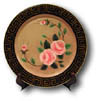Contemporary
Decorative Painting
Decorative painting has come a long way
from the rustic country painting and folk art painted by untrained
ordinary people. The decorative arts as a whole enjoyed a big
comeback in terms of interest around 50 years ago and at that
time, painted decoration, it is said, consisted of applying fine
art techniques to furniture and objects. As interest in the decorative painting techniques
of the past grew, and traditional folk arts were researched,
a new generation of folk and decorative artists emerged - learning
from techniques of the past and creating a new heritage of decorative
painting techniques and styles.
Many folk and decorative artists
of today have experimented with traditional folk art of the past to
create more modern techniques and ways of achieving the same
result using materials available today and they have been very
successful. Others modify and adapt traditional techniques and
designs to create their own unique brand of decorative painting.
  
Rather than be associated with a particular
region or country, contemporary decorative painting tend
to be associated with various contemporary techniques and
the artists that popularised them. As such there
are as many
techniques
of
decorative
painting for the budding decorative artist to learn as there
are artists.
Features
of Contemporary Decorative Painting General features of contemporary decorative
painting include:
- many
different kinds of specialty brushes used, not just the round brush.
These include the flat brush and
other relatively recent inventions like the angle, filbert,
dagger, rake etc.
- brushes are usually made of synthetic
material like taklon or are mixed with natural hair
- various
mediums like retarder / extender, clear glaze, blending
gel etc may be applied to give specific
effects and to aid painting
- it
is generally technique-driven. There is some strokework but
also more
flat painting and specific techniques
like floating, crosshatching, glazing, progressive highlighting,
layering etc
|